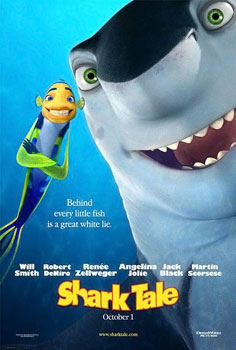
Shark Tale is a 2004 CGI comedy produced by DreamWorks Animation. In the story, a young fish (voiced by Will Smith) falsely claims to have killed the son of a shark mob boss to win favor with the mob boss' enemies and advance his own community standing. The movie additionally features the voices of Jack Black, Renée Zellweger, Angelina Jolie, Martin Scorsese, and Robert De Niro. Its original title was Sharkslayer, but the producers thought that this might provoke a degree of misunderstanding among the target audience of the film, children and families. Shark Tale is also one of the first three feature-length films to be made into a Game Boy Advance Video. It was released into theaters on October 1, 2004. Although the film was a commercial success it was a critical flop, especially when compared to the critically acclaimed Finding Nemo, a film with a similar theme, which also completely outshone Shark Tale commercially.(from wikipedia)
My comments: A conflict transformation story between sharks and smaller fishes. The link between the two is Lennie, a shark that does not fulfill the shark stereotype, since he is vegetarian. Even though I personally enjoyed the animation, it is said to be a disaster, since it was released soon after Nemo, and was compared with it. Strong racial stereotypes. (italian mafia, typical african american representation. Nevertheless, I don't get the impression that it is meant in a negative way. So, when are stereotypes negative and when are they positive? Can stereotypes be positive at all? Can they be regarded as part of a culture? I suppose this is something the people affected by them (=stereotypes) can answer. Immediate answer: Stereotypes that create hierarchical structures of high and low cultures and better / worse people are always negative. So? Then why is there grating in universities? Why should there be hierarchies at all in any part of life? - Preferably there shouldn't be. Then how about hierarchies of values? Maybe the world should function within ethical prescription. But ethical prescriptions created by whom?
No comments:
Post a Comment